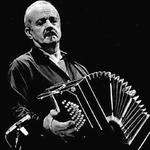
Astor Piazzolla Tour Dates and Upcoming Concerts
Welcome to the official artist page for Astor Piazzolla – your premier destination for
the latest concert tickets, tour announcements, and exclusive shows near you. Dive into
the music, explore the artist’s reviews and photos, and never miss another concert
moment. Stay updated, stay connected, and be the first to grab tickets for an
unforgettable musical experience.
On tour
Yes
Followers
46,141
Category
Latin, Tango
Concerts
See all upcoming events on Bandsintown and get tickets.
About Astor Piazzolla
Ástor Piazzolla (March 11, 1921 – July 4, 1992) was an Argentine tango composer and bandoneón player. His oeuvre revolutionized the traditional tango into a new style termed nuevo tango, incorporating elements from jazz and classical music. An excellent bandoneonist, he regularly performed his own compositions with different ensembles. He is known in his native land as "El Gran Ástor" ("The Great Ástor").
Born in Argentina in 1921 to immigrant Italian parents, Piazzolla spent most of his childhood with his family in New York City. While there, he acquired fluency in four languages: Spanish, English, French, and Italian. He also started playing the bandoneon, quickly rising to the status of child prodigy. While still quite young, he met Carlos Gardel, another great figure of Argentine tango. He returned to Argentina in 1937, where strictly traditional tango still reigned, and played in night clubs with a series of groups. The pianist Arthur Rubinstein (then living in Buenos Aires) advised him to study with the Argentine composer Alberto Ginastera. Delving into scores of Stravinsky, Bartók, Ravel, and others, he gave up tango temporarily and worked as a modernist classical composer.
At Ginastera's urging, in 1953 Piazzolla entered his "Buenos Aires" Symphony in a composition contest, and won a grant from the French government to study in Paris with the French composer and conductor Nadia Boulanger. The insightful Boulanger turned his life around in a day, as Piazzolla tells beautifully in his own words:
"When I met her, I showed her my kilos of symphonies and sonatas. She started to read them and suddenly came out with a horrible sentence: ‘It's very well written.’ And stopped, with a big period, round like a soccer ball. After a long while, she said: “Here you are like Stravinsky, like Bartók, like Ravel, but you know what happens? I can't find Piazzolla in this.” And she began to investigate my private life: what I did, what I did and did not play, if I was single, married, or living with someone, she was like an FBI agent! And I was very ashamed to tell her that I was a tango musician. Finally I said, “I play in a ‘night club.’” I didn't want to say “cabaret.” And she answered, “Night club, mais oui, but that is a cabaret, isn't it?” “Yes,” I answered, and thought, “I'll hit this woman in the head with a radio....” It wasn't easy to lie to her.
She kept asking: “You say that you are not pianist. What instrument do you play, then?” And I didn't want to tell her that I was a bandoneon player, because I thought, “Then she will throw me from the fourth floor.” Finally, I confessed and she asked me to play some bars of a tango of my own. She suddenly opened her eyes, took my hand and told me: “You idiot, that's Piazzolla!” And I took all the music I composed, ten years of my life, and sent it to hell in two seconds."
Piazzolla returned to Argentina in 1955, formed the Octeto Buenos Aires to play tangos, and never looked back.
Upon introducing his new approach to the tango (nuevo tango), he became a controversial figure among Argentines both musically and politically. The Argentine saying "in Argentina everything may change — except the tango" suggests some of the resistance he found in his native land. However, his music gained acceptance in Europe and North America, and his reworking of the tango was embraced by some liberal segments of Argentine society, who were pushing for political changes in parallel to his musical revolution.
During the period of Argentine military dictatorship from 1976 to 1983, Piazzolla lived in Italy, but returned many times to Argentina, recorded there, and on at least one occasion had lunch with the dictator Jorge Rafael Videla. However, his relationship with the dictator might have been less than friendly, as recounted in Astor Piazzolla, A manera de Memorias (a comprehensive collection of interviews, constituting a memoir):
In 1990 he suffered a thrombosis in Paris and he passed away two years later in Buenos Aires.
Piazzolla's nuevo tango was distinct from the traditional tango in its incorporation of elements of jazz, its use of extended harmonies and dissonance, its use of counterpoint, and its ventures into extended compositional forms. Piazzolla also introduced new instruments that were not used in the traditional tango, including the flute, saxophone, electric guitar, electronic instruments, and a full jazz/rock drum kit.
Piazzolla played with numerous ensembles beginning with the 1946 Orchestra, the 1955 "Octeto Buenos Aires", the 1960 "First Quintet", the 1971 "Noneto", the 1978 "Second Quintet" and the 1989 "Sextet". As well as providing original compositions and arrangements, he was the director and Bandoneon player in all of them. He also recorded an album with the famous cellist Yo-Yo Ma and another one with jazz sax player Gerry Mulligan. His numerous compositions include orchestral work such as the "Concierto para Bandoneón, Orquesta, Cuerdas y Percusión", "Doble-Concierto para Bandoneón y Guitarra", "Tres Tangos Sinfónicos" and "Concierto de Nácar para 9 Tanguistas y Orquesta", as well as song-form compositions that still today are well known by the general public in his country, like "Balada para un loco" (Ballad for a madman) and "Adiós Nonino" (dedicated to his grandfather) which he recorded many times with different musicians and ensembles. Biographers estimate that Piazzolla wrote around 3,000 pieces and recorded around 500.
Follow on Bandsintown
Genres
Latin, Tango
Similar Artists On Tour
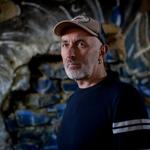
Yann Tiersen
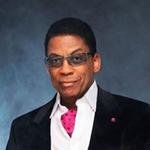
Herbie Hancock

Manu Chao

Massive Attack
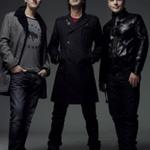
Soda Stereo
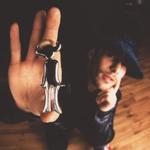
Jamiroquai
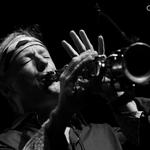
Bill Evans
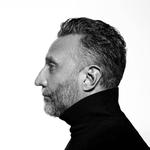
Fito Páez
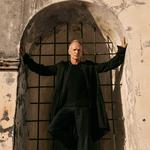
Sting
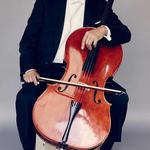
Yo-Yo Ma
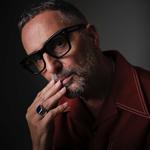
Jorge Drexler
Astor Piazzolla Tour Cities
Frequently Asked Questions About Astor Piazzolla
Concerts & Tour Date Information
Is Astor Piazzolla on tour?
Yes, Astor Piazzolla is currently on tour. If you’re interested in attending an upcoming
Astor Piazzolla concert, make sure to grab your tickets in advance. The Astor Piazzolla tour
is scheduled for 2 dates across 2 cities. Get
information on all upcoming tour dates and tickets for 2026-2027 with Hypebot.
How many upcoming tour dates is Astor Piazzolla scheduled to play?
Astor Piazzolla is scheduled to play 2 shows between 2026-2027. Buy
concert tickets to a nearby show through Hypebot.
When does the Astor Piazzolla tour start?
Astor Piazzolla’s tour starts Mar 12, 2026 and ends on Apr 24, 2026.
They will play 2 cities; their most recent concert was held in
Boulogne-billancourt at Auditorium de La Seine Musicale and their next upcoming concert
will be in Seligenstadt at Jakobsaal im St. Josefshaus.